For millions of people struggling to sleep well, traditional solutions often don’t cut it. But a growing body of research suggests that DSIP peptide, a naturally occurring compound in the brain, may hold the key to improving sleep quality.
Sleep disorders affect millions, and whether it’s trouble falling asleep, staying asleep, or waking up feeling unrested, these issues can significantly impact daily life. While traditional sleep aids such as sedatives can help, they often come with side effects that disrupt sleep quality and long-term health.
This is where Delta Sleep-Inducing Peptide, enters the conversation. Research has shown that this peptide for sleep may not just help with sleep onset, but it could also improve the overall quality of sleep by enhancing deep sleep stages. In this article, we will explore the science behind DSIP, its benefits, and how it could provide a more natural solution for those seeking restorative sleep.
Delta Sleep-Inducing Peptide benefits are becoming more recognized as researchers delve deeper into its potential. DSIP is a naturally occurring peptide in the human brain that plays a crucial role in regulating sleep. Unlike traditional sleep aids that induce sleep by sedating the brain, DSIP peptide for sleep appears to enhance the body’s natural sleep cycle, specifically focusing on the deep, restorative stages of sleep.
The peptide works by interacting with the brain’s neurotransmitters, promoting a more natural progression through the sleep cycle. Research has shown that this peptide can help individuals stay in deeper stages of sleep for longer periods, particularly Slow-Wave Sleep (SWS). This phase is crucial for physical recovery, memory consolidation, and overall brain function.
Explore DSIP Peptide from Direct Peptides , a naturally occurring peptide that enhances deep sleep and promotes restorative rest by improving sleep cycles.
Slow-Wave Sleep (SWS) is often called “deep sleep,” and it’s considered the most restorative phase of the sleep cycle. It’s during this time that the body performs essential functions such as muscle repair, immune system strengthening, and memory consolidation.
Without adequate SWS, we may feel fatigued, experience cognitive difficulties, and have weakened immune defenses. DSIP insomnia treatment has shown promise for individuals struggling to achieve this critical sleep phase.
This peptide plays a crucial role here by enhancing your body’s natural ability to enter these restorative stages of sleep. By promoting deeper sleep, DSIP can help the body and brain benefit from these critical recovery processes, ensuring better overall health and well-being.
While SWS is undoubtedly vital for recovery, it’s just one part of the broader sleep-wake cycle, which plays a crucial role in determining when we feel sleepy and when we wake up refreshed. DSIP also has a direct impact on this cycle, helping the body stay in deeper sleep for longer periods. Let’s take a closer look at how DSIP influences the sleep-wake rhythm.
Explore Peptide Supplies at Direct Peptides for all your reconstitution requirements.
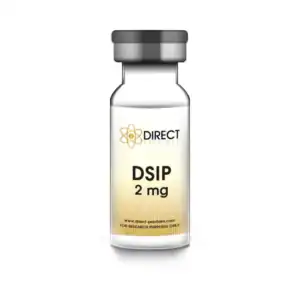 The body follows a natural sleep-wake cycle known as the circadian rhythm. This rhythm controls when we feel sleepy and when we feel awake. Disruptions to the circadian rhythm, such as those caused by stress, irregular sleep patterns, or shift work, can lead to poor sleep quality.
The body follows a natural sleep-wake cycle known as the circadian rhythm. This rhythm controls when we feel sleepy and when we feel awake. Disruptions to the circadian rhythm, such as those caused by stress, irregular sleep patterns, or shift work, can lead to poor sleep quality.
Peptides for sleep disorders, such as DSIP, have been found to help support and regulate the circadian rhythm, allowing the body to fall asleep more easily and stay asleep longer.
But the benefits of this peptide don’t stop there. It also helps regulate the sleep-wake cycle itself, ensuring that you stay in the deeper stages of sleep for longer, which is vital for recovery.
By supporting the natural progression of sleep stages, DSIP ensures that the body stays in the most restorative phases of sleep, leading to higher-quality rest.
While DSIP works in harmony with the body’s natural rhythms to promote restorative sleep, many traditional sleep medications work by artificially inducing sleep. Let’s compare the two approaches and see how DSIP stacks up against conventional sleep aids.
While traditional medications may help you fall asleep, they often disrupt the quality of your sleep and come with unwanted side effects. This peptide, on the other hand, takes a different approach working with your body’s natural sleep rhythms.
Unlike sedative sleep aids, which merely induce sleep without addressing the deeper, restorative phases, it promotes better rest by enhancing natural processes. This means you don’t just fall asleep faster, but you enter the deeper stages of sleep more effectively, improving the restorative aspects of your rest.
Traditional sleep medications, such as benzodiazepines and sedatives, are effective in helping people fall asleep quickly, but they often come with unwanted side effects. These include grogginess, dependency, and interference with the natural sleep cycle. Most of these medications sedate the brain but do not promote the deeper stages of sleep, meaning that while they may help with sleep initiation, they do not enhance sleep quality.
Unlike many conventional treatments, which can leave you groggy or dependent, this peptide works in harmony with your natural sleep cycles. But does it help with chronic sleep disorders like insomnia? Let’s find out how this compound may offer relief to those who struggle with sleepless nights.
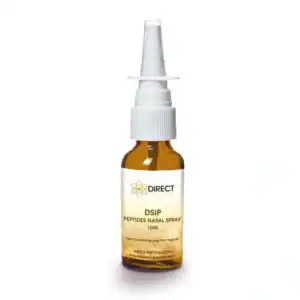 Insomnia is a sleep disorder that affects millions of people worldwide. Individuals with insomnia have trouble falling asleep, staying asleep, or both. It can be caused by a variety of factors, such as stress, anxiety, or medical conditions. While medications can help induce sleep, they do not always improve sleep quality or duration.
Insomnia is a sleep disorder that affects millions of people worldwide. Individuals with insomnia have trouble falling asleep, staying asleep, or both. It can be caused by a variety of factors, such as stress, anxiety, or medical conditions. While medications can help induce sleep, they do not always improve sleep quality or duration.
So, what does all of this mean for those who struggle with chronic insomnia? Studies suggest that this peptide may help with insomnia by improving both sleep initiation and sleep maintenance.
By promoting deeper and more restorative sleep, it can allow individuals with insomnia to stay asleep throughout the night, reducing the number of awakenings.
Moreover, since it supports natural sleep cycles, it may help individuals fall into deep sleep faster and stay there longer, ultimately improving sleep quality.
While the peptide shows promising results for those with insomnia, another widespread sleep issue is sleep deprivation. Let’s explore how it might help those who are not just struggling to sleep but are also chronically deprived of it.
Sleep deprivation, whether caused by work, stress, or other factors, has become a widespread issue in modern society. Chronic sleep deprivation can have a significant impact on physical and mental health, leading to problems such as impaired cognitive function, weakened immunity, and mood disturbances.
This peptide could be beneficial for individuals who are sleep-deprived, as it promotes deeper and more restorative sleep. By enhancing the time spent in Slow-Wave Sleep, it may help the body recover from the negative effects of sleep deprivation. Although more research is needed, this approach could be a useful tool for helping the body catch up on restorative sleep.
Unlike traditional sleep aids, which provide quick results, this peptide works more gradually. Its effects are not immediate but develop over time as the body adjusts to its influence on sleep. Research suggests that it may take several days or even weeks of consistent use before the full benefits are realized.
While some users may notice improvements in sleep within a few nights, it is recommended that this peptide be used consistently to allow the body to adapt. Since it supports the body’s natural sleep cycles, the improvements in sleep quality are more long-lasting and sustainable compared to the temporary relief provided by conventional medications.
Unlike quick-fix solutions like sedatives, its effects take time to develop, offering more sustainable benefits. However, as with any peptide used in research, potential side effects must be considered. Let’s examine the side effects reported in studies and what researchers have observed during controlled use.
 Like any peptide or supplement, this compound may have some side effects. However, studies have shown that it is generally well-tolerated. The most commonly reported side effects include mild dizziness, headaches, or grogginess upon waking.
Like any peptide or supplement, this compound may have some side effects. However, studies have shown that it is generally well-tolerated. The most commonly reported side effects include mild dizziness, headaches, or grogginess upon waking.
These side effects tend to be temporary and usually subside after the body adjusts to the peptide. Since this peptide is primarily used in research settings, there is still limited information on its long-term safety.
More studies are needed to fully understand its potential side effects, especially with extended use. However, based on current research, it appears to be a safe and promising option for improving sleep quality.
Since DSIP is still primarily used in research environments, it is important to follow proper protocols to ensure its safety and effectiveness. Researchers typically administer DSIP through injections or other controlled methods in clinical studies. Monitoring sleep patterns and potential side effects is crucial for understanding the peptide’s full potential.
To study DSIP’s effects, researchers use a variety of methods, including sleep studies, to observe how it influences sleep architecture and quality. By following strict safety protocols and dosage guidelines, researchers can ensure that DSIP is used effectively and that the results of the studies are accurate.
While DSIP shows promise as a sleep aid, it’s not the only peptide being studied for its potential benefits. Peptides for sleep disorders, such as Epithalon and MK677, are also gaining attention in sleep research.
These peptides, while functioning through different mechanisms, could complement the effects of DSIP in improving sleep quality. At Direct Peptides, we offer all three of these research peptides in 99% purity, allowing researchers to explore their individual and synergistic effects on sleep.
 Epithalon is a peptide that is primarily known for its anti-aging properties, but it also plays a role in regulating sleep. One of Epithalon’s key functions is its ability to stimulate the production of melatonin, a hormone responsible for regulating the sleep-wake cycle.
Epithalon is a peptide that is primarily known for its anti-aging properties, but it also plays a role in regulating sleep. One of Epithalon’s key functions is its ability to stimulate the production of melatonin, a hormone responsible for regulating the sleep-wake cycle.
By boosting melatonin production, Epithalon may help individuals who struggle with irregular sleep patterns, such as shift workers or those with jet lag.
Epithalon also works to synchronize the body’s circadian rhythms, which could lead to more consistent sleep patterns. While DSIP focuses on enhancing deep sleep stages, Epithalon works to regulate the overall sleep cycle, making it a valuable tool for those looking to improve sleep quality.
Discover Epithalon from Direct Peptides , a powerful peptide known for regulating circadian rhythms and supporting healthy sleep patterns for better sleep quality.
MK677, also known as Ibutamoren, is another peptide that has been studied for its impact on sleep. Unlike DSIP, which primarily enhances deep sleep, MK677 works by stimulating the release of growth hormone.
Growth hormone is crucial for various processes in the body, including muscle repair and immune function. It is also released during deep sleep, particularly Slow-Wave Sleep.
By increasing growth hormone levels, MK677 may improve the quality of sleep by enhancing both deep sleep and REM sleep.
Research has shown that MK677 can help individuals achieve longer periods of restful sleep, making it a promising option for those seeking better sleep quality.
Check out MK677 from Direct Peptides , a growth hormone secretagogue that enhances REM sleep and deep sleep, improving overall sleep quality and recovery.
DSIP peptide for sleep holds significant potential for improving sleep quality, particularly by enhancing deep, restorative sleep. Unlike traditional sleep aids, which can disrupt natural sleep cycles, DSIP works with the body’s internal rhythms to promote more natural, high-quality sleep.
While further research is needed to fully understand its long-term effects, DSIP represents a breakthrough in the search for natural sleep solutions. As more peptides like Epithalon and MK677 are explored for their sleep-enhancing properties, the future of sleep improvement looks brighter.
These peptides could provide a more holistic approach to sleep, addressing various aspects of sleep quality and recovery. For those seeking better sleep without the side effects of traditional sleep medications, we at Direct Peptides offer DSIP and other research peptides with guaranteed 99% purity, ensuring you receive the highest quality products for your research needs.
[1] Kovalzon VM, Strekalova TV. Delta sleep-inducing peptide (DSIP): a still unresolved riddle. J Neurochem. 2006 Apr;97(2):303-9.
[2] Bes F, Hofman W, Schuur J, Van Boxtel C. Effects of delta sleep-inducing peptide on sleep of chronic insomniac patients. A double-blind study. Neuropsychobiology. 1992;26(4):193-7.
[3] Schneider-Helmert D, Schoenenberger GA. Effects of DSIP in man. Multifunctional psychophysiological properties besides induction of natural sleep. Neuropsychobiology. 1983;9(4):197-206.
[4] Khavinson V, Goncharova N, Lapin B. Synthetic tetrapeptide epitalon restores disturbed neuroendocrine regulation in senescent monkeys. Neuro Endocrinol Lett. 2001 Aug;22(4):251-4.
[5] Copinschi G, Leproult R, Van Onderbergen A, Caufriez A, Cole KY, Schilling LM, Mendel CM, De Lepeleire I, Bolognese JA, Van Cauter E. Prolonged oral treatment with MK-677, a novel growth hormone secretagogue, improves sleep quality in man. Neuroendocrinology. 1997 Oct;66(4):278-86.
Shop ALL Peptide Vials from Direct Peptides today, your trusted supplier of premium clinical grade peptides online.
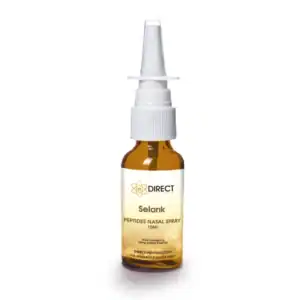
Selank Nasal Spray
£42.58 – £79.16Price range: £42.58 through £79.16 Select options This product has multiple variants. The options may be chosen on the product page
BULK BUY
DSIP Peptide Vial
£20.99 – £178.47Price range: £20.99 through £178.47 Select options This product has multiple variants. The options may be chosen on the product page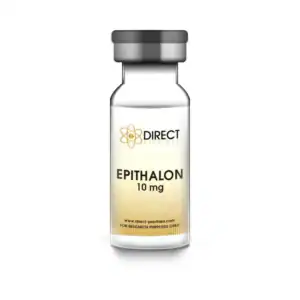
BULK BUY
Epithalon Peptide Vial
£13.75 – £318.75Price range: £13.75 through £318.75 Select options This product has multiple variants. The options may be chosen on the product page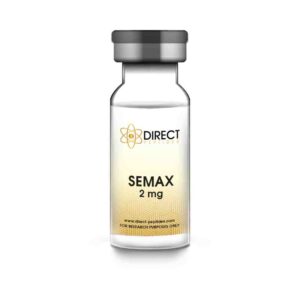
Semax Peptide Vial
£15.99 – £58.87Price range: £15.99 through £58.87 Select options This product has multiple variants. The options may be chosen on the product pageALL CONTENT AND PRODUCT INFORMATION AVAILABLE ON THIS WEBSITE IS FOR EDUCATIONAL PURPOSES ONLY.
DISCLAIMER: These products are intended solely as a research chemical only. This classification allows for their use only for research development and laboratory studies. The information available on our Direct Peptides website: https://direct-peptides.com is provided for educational purposes only. These products are not for human or animal use or consumption in any manner. Handling of these products should be limited to suitably qualified professionals. They are not to be classified as a drug, food, cosmetic, or medicinal product and must not be mislabelled or used as such.